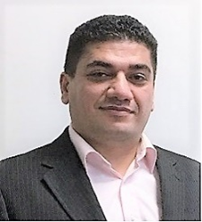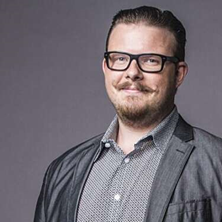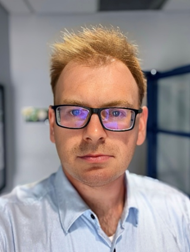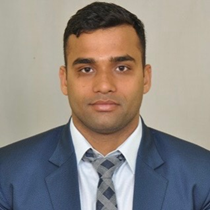
KEYNOTE I
Title: Building Intelligent Mechanical Fault Diagnosis Frameworks with Deep Learning
Keynote Speaker:
Dr. Hamid Reza Karimi, Professor, Department of Mechanical Engineering, Politecnico di Milano, Milan, Italy

Abstract:
Deep learning methods for fault diagnosis play a crucial role in monitoring and detecting the operating conditions of mechanical equipment. This talk explores high-accuracy and reliable deep learning-based algorithms for identifying the fault states of rotating machinery. It also addresses key challenges in deep learning algorithms, including limited training samples, feature extraction capability, interpretability, and multi-source information fusion for mechanical fault diagnosis.
Speaker’s Biography:
Hamid Reza Karimi is Professor of Applied Mechanics with the Department of Mechanical Engineering, Politecnico di Milano, Milan, Italy and the Honorary Visiting Professor within the School of Computing & Engineering at the University of Huddersfield, UK. Prof. Karimi’s original research and development achievements span a broad spectrum within the topic of automation/control systems, and intelligence systems with applications to complex systems such as vehicles, robotics and mechatronics. Prof. Karimi is an ordinary Member of Academia Europaea (MAE), Member of Agder Academy of Science and Letters in Norway, Honorary Academic Member of National Academy of Sciences of Bolivia, Distinguished Fellow of the International Institute of Acoustics and Vibration (IIAV), Fellow of The International Society for Condition Monitoring (ISCM), Fellow of the Asia-Pacific Artificial Intelligence Association (AAIA), and also a member of the IFAC Technical Committee on Mechatronic Systems, the IFAC Technical Committee on Robust Control, the IFAC Technical Committee on Automotive Control, member of the board of Directors of The International Institute of Acoustics and Vibration (IIAV) and member of Management Committee of The International Society for Condition Monitoring (ISCM). Prof. Karimi is the recipient of the 2021 BINDT CM Innovation Award, the Web of Science Highly Cited Researcher in Engineering, the 2020 IEEE Transactions on Circuits and Systems Guillemin-Cauer Best Paper Award, August-Wilhelm-Scheer Visiting Professorship Award, JSPS (Japan Society for the Promotion of Science) Research Award, and Alexander-von-Humboldt-Stiftung research Award, for instance. Prof. Karimi has been Editor-in-Chief, Subject Editor, Technical Editor or Associate Editor for several international journals and Book Series Editor for Springer, CRC Press and Elsevier. He has also participated as General Chair, keynote/plenary speaker, distinguished speaker or program chair for several international conferences in the areas of Control Systems, Robotics and Mechatronics. Prof. Karimi is the conference chair for the 2026 World Congress on Condition Monitoring in Milan, Italy.
KEYNOTE II
Title: Making Prognostics Matter: How VDMXL Connects System Health with Business Value
Keynote Speaker:
Mr. Peter Decaigny, Partner at Mainnovation, Belgium

Abstract:
Technological advances in Prognostics and System Health Management (PHM) deliver increasingly accurate insights into asset conditions and failure risks. However, these insights often remain underutilized at the strategic level, where investment decisions are made. This presentation addresses the gap between technical capability and business impact and shows how to create alignment between engineering and executive perspectives. Using the Value Driven Maintenance (VDMXL) model, we will demonstrate how organizations can quantify the contribution of maintenance initiatives to key value drivers, such as uptime, cost control, safety, and asset lifetime. VDMXL provides a structured framework to evaluate, prioritize, and communicate maintenance strategies in business terms, making it a powerful tool not only for optimization, but also for stakeholder buy-in. Through industry examples, we will explore how PHM can support smarter asset decisions when embedded in a broader asset management logic. Topics such as change acceptance, cross-functional dialogue, and the creation of a shared language between technical and non-technical stakeholders will be central themes of the session.
Speaker’s Biography:
Peter Decaigny is a Partner at Mainnovation, an international consultancy firm specializing in Maintenance and Asset Management. He holds a Master of Science in Electrical Engineering (1995) and later obtained a degree in Business Engineering from Ghent University (in cooperation with Vlerick Business School). Peter has held various maintenance management positions throughout his career. He started at Volvo Cars Ghent, where he was appointed in 2004 to standardize the maintenance approach across all Volvo Cars production sites. In this role, he implemented the Value Driven Maintenance (VDM) methodology. From 2006 to 2009, he worked as Business Team Manager at Siemens, leading a team focused on energy and maintenance projects. Since 2009, Peter has been active at Mainnovation. As a Partner, he is responsible for the company’s operations in Belgium and France. He conducts VDMXL Growth Analysis and leads large-scale transformation projects in asset-intensive industries. In addition to his consulting work, Peter is also a part-time lecturer at Ghent University, where he teaches courses on Maintenance and Asset Management.
KEYNOTE III
Title: Scalable Industrial Predictive Maintenance for Mass Deployment
Keynote Speakers:
Mr. Tom Rombouts, Reliability & Data Driven Solutions Director, I-Care Group, Belgium
Abstract:
The Industrial Prediction Maintenance market is growing exponentially. In this Key-note, Tom Rombouts (I-care Group | Reliability & Data Driven Solutions Director) will share how I-care is future proofed by vertically and horizontally scaling their business and operations. The presentation will cover the progress in IIoT, Data platforms, AI data screening and Customer Reliability improvement projects. This is the end-to-end expert approach that the industry needs to tackle current day challenges.
KEYNOTE IV
Title: Prognostics and Health Management in Well Construction within the Oil and Gas Industry
Keynote Speaker:
Dr. Dmitry Belov, Principal Data Scientist, SLB, Houston, USA

Abstract:
Drilling operations in the oil and gas industry represent one of the most complex and high-risk environments for equipment reliability. Extreme downhole conditions—high pressure, temperature, and continuous mechanical stress—lead to accelerated degradation and unplanned failures, resulting in significant non-productive time. This presentation explores how Prognostics and Health Management techniques are applied to improve the reliability and efficiency of well construction systems. This talk will outline the primary challenges encountered in drilling operations, followed by a detailed overview of the typical architecture of PHM systems designed for this domain. It will explain how data from downhole and surface sensors is collected and processed using a combination of physical modeling, signal analysis, and machine learning techniques to detect anomalies, evaluate equipment health, and estimate Remaining Useful Life. Several field-proven PHM algorithms will be presented, demonstrating how predictive diagnostics are used to monitor drill string components, mud motors, and telemetry components. Emphasis will be placed on hybrid modeling approaches, real-time deployment, and validation with operational data. This presentation highlights transferable methodologies and key insights relevant to PHM practitioners working with complex electromechanical systems beyond the oilfield environment.
Speaker’s Biography:
Dmitry Belov is a Principal Data Scientist at SLB, currently based in Houston, Texas. Since joining SLB in 2008 as a Research Scientist, he has contributed across a wide range of technical roles, including Physicist, Modeling & Simulation Engineer, and Data Scientist. His professional journey has spanned multiple SLB technology centers in Russia, Japan, the United Kingdom, and the United States, where he has supported innovation in both corporate research and operational environments. Dmitry holds a PhD in Mechanical Engineering from St. Petersburg State Polytechnic University, with a specialization in applied mechanics and computational modeling. His current work focuses on advanced drilling technologies in the oil and gas industry, with expertise in numerical simulation, signal processing, and algorithm development for Prognostics and Health Management (PHM) applications. He leads the development of predictive analytics, digital twins, and machine learning solutions that improve asset reliability, enable condition-based maintenance, and optimize operational efficiency for downhole tools and drilling systems.
TUTORIAL SPEAKER
Title: Enhancing Predictive Maintenance with Digital Twins
Tutorial Speaker:
Prof. Pradeep Kundu, Assistant Professor, KU Leuven, Belgium

Abstract:
This tutorial focuses on the development of digital twins for prognostics and health management applications. Machine learning (ML)-based data-centric models are frequently employed for health assessment, including anomaly detection, fault diagnostics, and prognostics for predicting remaining useful life. However, the development of these models is often hindered by the scarcity of training data, particularly for unreported damage. Physics-based models, which leverage an understanding of damage dynamics and progression, offer an alternative by reducing the data requirements of data-driven models. Despite their potential, these models can exhibit high modeling errors due to assumptions and simplicity. The tutorial explores the concept of the digital twin, a dynamic virtual representation of a physical asset, as a solution to these limitations. Digital twins provide an opportunity to enhance prediction accuracy by integrating both data-centric and physics-based approaches. The discussion highlights how digital twins can address challenges such as the unavailability of data for all failure modes, the black-box nature of ML models, high modeling uncertainty at the fleet level, and the assumptions inherent in physics-based models.
Speaker’s Biography:
Pradeep Kundu is currently working as an assistant professor in the Department of Mechanical Engineering at KU Leuven, Belgium. Before joining KU Leuven, he worked as a Post-Doctoral Fellow and Research Associate at the University of Cincinnati, USA, and the University of Strathclyde, UK, respectively. His research focused on the broad domain of utilizing the potential of digital twins, artificial intelligence, and signal processing techniques to solve asset health management and quality control problems. His research helps industries in reducing unplanned outages, increase productivity, automate quality control, and reduce operation and maintenance costs. He has published around 50 articles in reputed journals and conferences. He has delivered four keynote speeches, two-panel talks, and over 20 invited lectures. He serves as a guest/handling/associate editor for 4 journals, including his current role as an associate editor for Measurement, Elsevier (IF 5.2) journal. He contributed to over 10 conference committees, including his current role as General Chair for the 15th Prognostics and System Health Management Conference 2025. He has received several awards, including runner-up for PHM Europe 2022 Data Challenge, overseas visiting doctoral fellowship from SERB, etc.
|
 |
|
|
||
 |
 |
 |
 |
|
|
|
 |
|
 |
 |
|





